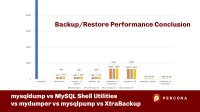https://www.percona.com/blog/wp-content/uploads/2022/02/MySQL-Restore-Backup-Comparison.png
 A little bit ago, I released a blog post comparing the backup performance of different MySQL tools such as mysqldump, the MySQL Shell feature called Instance Dump, mysqlpump, mydumper, and Percona XtraBackup. You can find the first analysis here:
A little bit ago, I released a blog post comparing the backup performance of different MySQL tools such as mysqldump, the MySQL Shell feature called Instance Dump, mysqlpump, mydumper, and Percona XtraBackup. You can find the first analysis here:
However, we know the backups are just the first part of the story. What about the restore time? And which tool performs better for the complete operation (backup+restore)?
Let’s see the results and the conclusion in the following sections.
Benchmark Results
I ran the benchmark on an m5dn.8xlarge instance, with 128GB RAM, 32 vCPU, and two io1 disks of 600GB (one for backup and the other one for MySQL data) with 5000 provisioned IOPS. The MySQL version was 8.0.26 and configured with 89Gb of the buffer pool, 20Gb of redo log, and a sample database of 96 GB (more details below).
When we sum the backup time and the restore time, we can observe the results in the chart below:

And if we analyze the chart without mysqldump to have a better idea of how the other tools performed:

The backup size created by each tool:

Note that the backup size of XtraBackup (without compression) is the size of the datadir without the binary logs. Next, we can see the backup time:

And the restore time:

Analyzing The Results
When we sum backup and restore times, we observe that the fastest tool is Percona XtraBackup. The main point of XtraBackup is not even the speed but its capacity to perform PITR backups. Also, the tool supports compression and encryption.
We can also observe that mydumper/myloader and MySQL Shell utilities produce good results in both phases. The difference from Xtrabackup is that both tools perform logical backups, which means that these tools connect to MySQL and extract the data to dump files. Because they have to extract data from MySQL, these tools are more sensitive for the MySQL configuration and backup/restore parametrization. For example, MyDumper/MyLoader has some extra options that can improve the backup and restore performance, such as --rows, --chunk-filesize, and --innodb-optimize-keys.
Note that XtraBackup, MyDumper, and mysqldump support stream restore, reducing overall timing to perform the backup and restore operation.
The tool that has the most inconsistent behavior is mysqlpump where the tool can make speedy backups, but the restore performance is terrible since it is single-threaded the same way as mysqldump.
Based on the tests, we can observe that compression, TLS, socket, or TCP/IP do not significantly impact the time needed to perform the whole operation. Because there is no significant impact, tools that can perform compression and use TLS like MySQL Shell, mydumper/myloader, and XtraBackup have a good advantage since their backups are safer and use less disk space (less disk space = fewer costs). The trade-off between the features of these tools and the time spent to backup and restore the database is something that all DBAs should evaluate.
And to answer some questions/comments about this topic:
The difference you see between MySQL Shell and mydumper can be explained by the use of SSL in one and clear transfer in the other. Encryption has a cost, unfortunately.
A: Indeed, SSL has a cost. However, when we put the security benefits of the SSL and consider the whole process, it is a small cost (in the same way as compression).
Does XtraBackup support ZSTD?
A: At this moment, no. However, there is a feature request for this (you can follow the JIRA ticket to receive updates about it):
https://jira.percona.com/browse/PXB-2669
Is there any difference substituting mysqldump | gzip with a different compression tool?
A: The difference is neglectable piping with gzip or sending the uncompressed dump to the disk. The mysqldump tool is the most inefficient option due to its single-thread nature, severely impacting performance. Because of its single-thread nature, the tool cannot extract maximum performance from hardware resources (in particular I/O).
How is the performance impact on MySQL when running the backups?
A: Unfortunately, I did not measure this. Based on my experience, there is a dedicated replica server for backup most of the time. If the MySQL community is interested in this test, I can write another post about this (leave in the comments your opinion).
It is possible to squeeze more juice from MySQL in the restore phase. We can take some actions like disabling the binary log and making asynchronous writes. You can check the advice (pros and cons) in these two blog posts:
https://www.percona.com/blog/2020/05/14/tuning-mysql-innodb-flushing-for-a-write-intensive-workload/
https://www.percona.com/blog/2014/05/23/improve-innodb-performance-write-bound-loads/
To conclude, this blog post is intended to give an overall idea of how these tools perform. I tried to stick with the default options of each tool (except the number of threads) to keep the test as fair as possible. Also, time is not the only thing that companies consider to adopt a backup method (security, encryption, and data protection are very important). In my daily tasks, I use mydumper/myloader and XtraBackup because I’m more familiar with the commands, and I have used them for a long time. However, I would advise keeping an eye on the MySQL Shell utilities since it is becoming a fascinating tool to perform many tasks (backup and restore have excellent results).
Hardware and Software Specs
These are the specs of the benchmark:
- 32 CPUs
- 128GB Memory
- 2x io1 disks 600 GB with 5000 IOPS each
- Centos 7.9
- MySQL 8.0.26
- MySQL shell 8.0.26
- mydumper 0.11.5 – gzip
- mydumper 0.11.5 – zstd
- Xtrabackup 8.0.26
Useful Resources
Finally, you can reach us through the social networks, our forum, or access our material using the links presented below:
- Blog
- Solution Briefs
- White Papers
- Ebooks
- Technical Presentations archive
- Videos/Recorded Webinars
- Forum
- Knowledge Base (Percona Subscriber exclusive content)
Planet MySQL